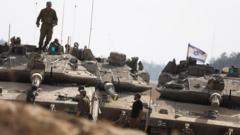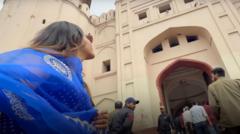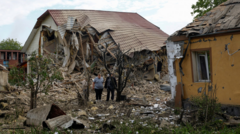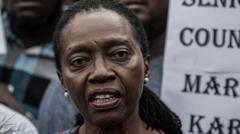Recent military activities targeting Maoist insurgents in central India have resulted in numerous casualties, raising concerns among human rights activists about the potential inclusion of innocent civilians among the dead. As the government sets a strong deadline to resolve the conflict, calls for accountability grow.
Surge in Military Operations Against Maoist Insurgents in Central India

Surge in Military Operations Against Maoist Insurgents in Central India
Indian security forces have ramped up efforts to defeat communist militants as a deadline looms for resolving a longstanding insurgency.
In a significant escalation of military operations, Indian security forces reported the killing of at least 27 individuals in Chhattisgarh on Wednesday in an ongoing campaign against communist militants known as Maoists. Prabhat Kumar, the state's police chief, claimed that several high-ranking leaders of the insurgent group were among the casualties, including Nambala Keshav Rao, a prominent figure in the rebellion.
The recent military offensive follows another operation last week, which claimed the lives of 31 suspected Maoists in a mountainous area that borders Chhattisgarh and its neighboring state. Amit Shah, the Union Home Minister, hailed this past confrontation as a “historic breakthrough,” underscoring the government's commitment to eradicate the Maoist challenge by March of next year, after over 50 years of ongoing conflict.
However, the rising death toll has drawn criticism from human rights advocates. They have urged comprehensive investigations to determine whether all those killed were combatants or if innocent civilians were also caught in the crossfire. Bela Bhatia, a human rights lawyer, emphasized the need for timely identification of the deceased while highlighting issues with the government’s delayed reporting of information related to casualties.
As the conflict intensifies, the situation remains precarious as various perspectives on the government's measures clash amidst the ongoing humanitarian concerns.
The recent military offensive follows another operation last week, which claimed the lives of 31 suspected Maoists in a mountainous area that borders Chhattisgarh and its neighboring state. Amit Shah, the Union Home Minister, hailed this past confrontation as a “historic breakthrough,” underscoring the government's commitment to eradicate the Maoist challenge by March of next year, after over 50 years of ongoing conflict.
However, the rising death toll has drawn criticism from human rights advocates. They have urged comprehensive investigations to determine whether all those killed were combatants or if innocent civilians were also caught in the crossfire. Bela Bhatia, a human rights lawyer, emphasized the need for timely identification of the deceased while highlighting issues with the government’s delayed reporting of information related to casualties.
As the conflict intensifies, the situation remains precarious as various perspectives on the government's measures clash amidst the ongoing humanitarian concerns.




















